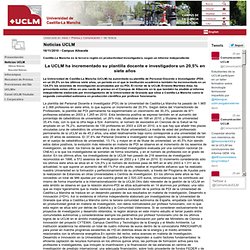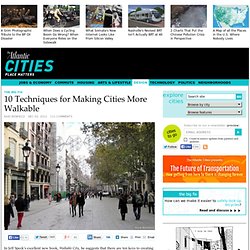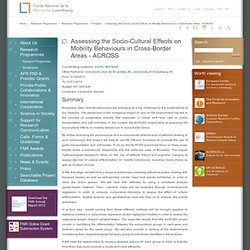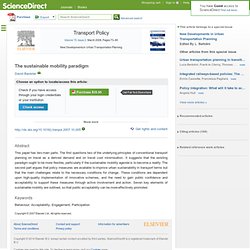

Prensa y Comunicación - Universidad de Castilla-La Mancha. Castilla-La Mancha es la tercera región en productividad investigadora, según un informe independiente La UCLM ha incrementado su plantilla docente e investigadora un 20,5% en siete años La Universidad de Castilla-La Mancha (UCLM) ha aumentado su plantilla de Personal Docente e Investigador (PDI) en un 20,5% en los últimos siete años, un período en el que la institución académica también ha incrementado en un 124,5% los sexenios de investigación acumulados por su PDI.

El rector de la UCLM, Ernesto Martínez Ataz, ha presentado estas cifras en una rueda de prensa en el Campus de Albacete en la que también ha aludido al informe independiente elaborado por investigadores de la Universidad de Granada que sitúa a Castilla-La Mancha como la segunda comunidad autónoma en producción científica por profesor funcionario. Gabinete de Comunicación UCLMAlbacete, 16 de noviembre de 2010. 10 Techniques for Making Cities More Walkable - Design. In Jeff Speck’s excellent new book, Walkable City, he suggests that there are ten keys to creating walkability.

Most of them also have something to do with redressing the deleterious effects caused by our allowing cars to dominate urban spaces for decades. I don’t necessarily agree with every detail, and my own list might differ in some ways that reflect my own experience and values. But it’s a heck of a good menu to get city leaders and thinkers started in making their communities more hospitable to walkers.
(I can’t say that Jeff and I know each other well, but we’re friends, and I like him a lot. I’m listed in the acknowledgments, and one of my articles is cited in the narrative. Here are the author’s ten steps of walkability, with a memorable line from his description of each: 1. Photo courtesy of Flickr user Richard Masoner 2. 3. 4. 5. 6. 7. FNR. Assessing the Socio-Cultural Effects on Mobility Behaviours in Cross-Border Areas - ACROSS Coordinating Institution: CEPS / INSTEAD Other Partner(s): Université Libre de Bruxelles (B) , University of Strasbourg (F) From: 01/02/2011 To: 31/01/2014 Budget: 541,000.00€ Contact(s): Carpentier Samuel Summary Nowadays, daily mobility behaviours are emerging as a big challenge for the sustainability of our lifestyles.

The awareness of the increasing impact of cars on the environment has led to the concept of sustainable mobility that supposes a modal shift from cars to public transportation and soft mobilities. In this context, the ACROSS project aims at assessing the sociocultural effects on mobility behaviours in cross-border areas. By further analysing the psychosocial and environmental determinants of attitudes leading to such behaviours, this project will help to identify efficient incentives to promote the use of public transportation and soft modes. Websites: Transport Policy - The sustainable mobility paradigm. Volume 15, Issue 2, March 2008, Pages 73–80 New Developments in Urban Transportation Planning Edited By L.

Bertolini Abstract This paper has two main parts. Keywords Behaviour; Acceptability; Engagement; Participation Copyright © 2007 Elsevier Ltd. Greening the Ivory Tower. Victoria Transport Institute - Main Page.